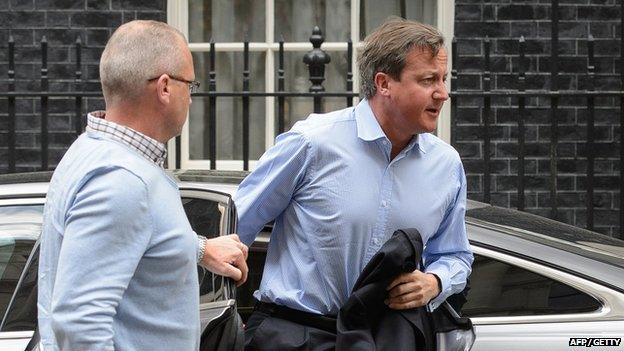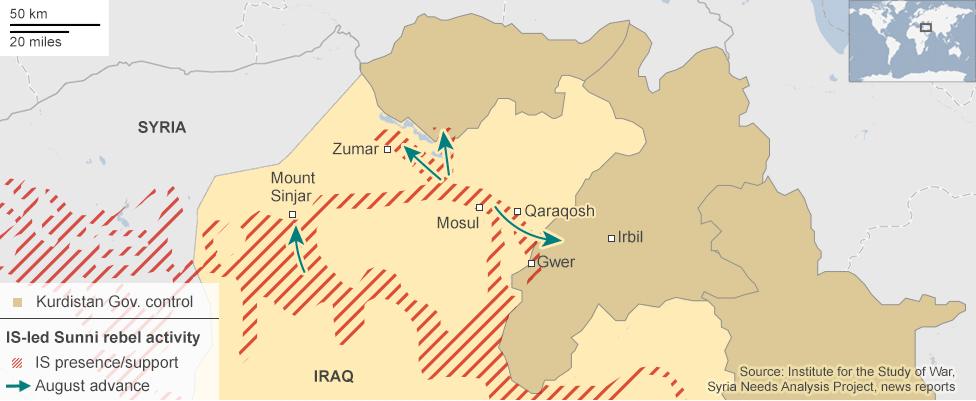James Foley beheading suspect probably British, David Cameron says
- Published
David Cameron: "This is not a time for a knee-jerk reaction"
David Cameron has said it looks "increasingly likely" a man thought to have been involved in a US journalist's beheading is British, as UK police try to confirm the militant's identity.
The PM said James Foley's killing was "deeply shocking" but warned it was "not a time for a knee-jerk reaction".
He also said the government would "redouble" efforts to stop Britons travelling to fight in Iraq and Syria.
Mr Foley, 40, had been missing since he was seized in Syria in 2012.
The extremist group, Islamic State (IS), posted footage of the killing online, which has since been verified by the White House.
The Metropolitan Police has warned that "viewing, downloading or disseminating" the video might be an offence under terrorism laws.
'Resolve and patience'
Speaking in the US, Mr Foley's father, John, said he was deeply shocked at the death of his son and called him a "martyr for freedom".
President Barack Obama condemned the killing as "hateful" and pledged the US would be "vigilant and relentless" and "do what is necessary to see that justice is done".
Mr Cameron, who returned from holiday to chair emergency meetings with Home and Foreign Office officials, said the killer had not yet been identified but said it was "deeply shocking" that he appeared to be British.
"Let's be clear what this act is - it is an act of murder, and murder without any justification," he told BBC political editor Nick Robinson.
The PM said "far too many" British citizens had travelled to Syria and Iraq to take part in the fighting there and the government would "redouble all our efforts" to stop people going.
Mr Cameron reiterated that the UK would not get involved in another Iraq war and there would be "no combat boots on the ground".
The fight against Islamic extremism required "resolve" and "patience", he added.
Proposals for "even tougher laws" would be looked at, he said, but there would be no knee-jerk reaction.

David Cameron returned from holiday to chair meetings
The video footage of Mr Foley, titled A Message to America, shows the journalist wearing an orange jumpsuit, kneeling in desert-like terrain beside an armed man dressed in black.
The masked militant, who speaks with an English accent and identifies himself as an IS member, says the journalist's death is in retaliation for US attacks on IS in Iraq.
After he speaks, the militant appears to start cutting at his captive's neck before the video fades to black.
Mr Foley's body is then seen on the ground.
Atrocities
Foreign Secretary Philip Hammond said: "We're absolutely aware that there are significant numbers of British nationals involved in terrible crimes, probably in the commission of atrocities, making jihad with Isil [now known as IS] and other extremist organisations.
"This is something we have been tracking and dealing with for many many months and I don't think this video changes anything."
It is estimated that IS, which has seized large parts of northern Iraq and Syria, has up to 400 recruits from the UK in its ranks.
Some 69 people suspected of Syria-related jihadist activities have been arrested in the UK.
Sunday Times photographer Paul Conroy: "Without him, it will be darker"
The foreign secretary felt "absolute horror" at the "brutal execution", he told BBC Radio 4's Today programme.
Mr Foley's mother Diane said on Facebook, external she was proud of her son, who had reported extensively in the Middle East, working for the US-based Global Post and other outlets including the French news agency AFP.
"He gave his life trying to expose the world to the suffering of the Syrian people," she wrote.
Sunday Times photographer Paul Conroy, who worked alongside Mr Foley in 2011, said: "Without him... these tyrants will get away with things without people probing and pushing to show people what's really happening in these war zones."
The killer speaks with a British accent, as the BBC's Frank Gardner reports. Some listeners may find parts of this audio disturbing.
Frank Gardner, the BBC's security correspondent, said the video could encourage people to join IS.
"It attracts the worst kind of psychopaths," he said. "This is not about religion. It's not even about territory."
'Vicious' British fighters
Shiraz Maher, from King's College London's International Centre for the Study of Radicalisation, said British IS recruits were "not there to take a back seat role" and many were becoming "hardened killers".
He told the Today programme that British fighters were "operating as suicide bombers; we have seen them operating as executioners.
"Unfortunately they are amongst some of the most vicious and vociferous fighters who are out there."
Qari Asim, imam at the Makkah mosque in Leeds, told BBC News the risk of young British Muslims joining the fighting was "getting greater because of our... involvement in Iraq".
He called on the Muslim community to "work with intelligence services and the government and everyone else to make sure that this poison doesn't reach our borders".

Formed out of al-Qaeda in Iraq (AQI) in 2013, IS captured Raqqa in eastern Syria
By early 2014 it controlled Falluja in western Iraq
It has since captured broad swathes of Iraq, seizing Mosul in the north in June
The violence has displaced an estimated 1.2 million people in Iraq alone
Pursuing an extreme form of Sunni Islam, IS has persecuted non-Muslims such as Yazidis and Christians, as well as Shia Muslims, whom it regards as heretics
In July alone, IS expanded dramatically, recruiting some 6,300 new fighters largely in Raqqa, an activist monitoring group said

Islamic State activities as of 14 August
